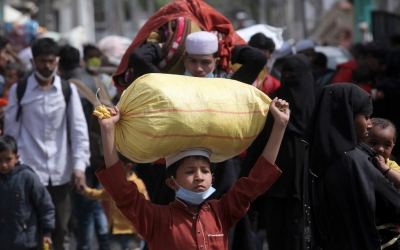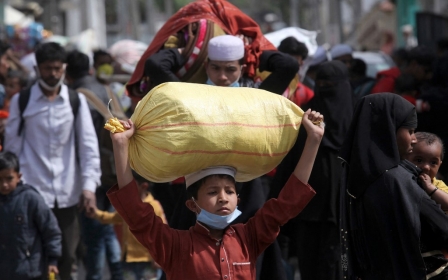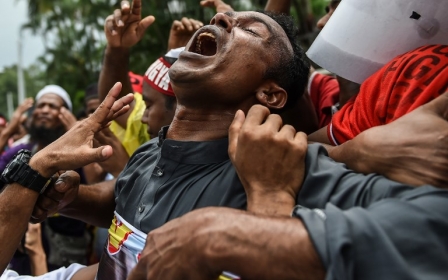ICC seeks arrest warrant for Myanmar's president for crimes against Rohingya Muslims

Karim Khan, the International Criminal Court’s (ICC) prosecutor, has announced that he is seeking an arrest warrant for Myanmar’s acting President Min Aung Hlaing for alleged crimes against humanity committed against the Rohingya population.
Wednesday’s announcement is the first ICC application for arrest warrants for a senior government official from Myanmar, which for more than a decade has been accused of persecuting the mainly Muslim ethnic group.
Khan’s office is planning to file more applications for other senior Myanmar leaders in the future, he said in his announcement.
“In doing so, we will be demonstrating, together with all of our partners, that the Rohingya have not been forgotten. That they, like all people around the world, are entitled to the protection of the law,” he said.
A panel of three judges is now tasked with examining evidence in Khan’s request and issuing the warrants.
New MEE newsletter: Jerusalem Dispatch
Sign up to get the latest insights and analysis on Israel-Palestine, alongside Turkey Unpacked and other MEE newsletters
The case dates back to 14 November 2019, when Khan’s office began investigating alleged crimes committed against the Rohingya between 2016 and 2017 in Rakhine State, Myanmar, and the forced deportation of the Rohingya to neighbouring Bangladesh.
“After an extensive, independent and impartial investigation, my Office has concluded that there are reasonable grounds to believe that Senior General and Acting President Min Aung Hlaing, Commander-in-Chief of the Myanmar Defence Services, bears criminal responsibility for the crimes against humanity of deportation and persecution of the Rohingya, committed in Myanmar, and in part in Bangladesh,” Khan said.
“My Office alleges that these crimes were committed between 25 August 2017 and 31 December 2017 by the armed forces of Myanmar, the Tatmadaw, supported by the national police, the border guard police, as well as non-Rohingya civilians.”
The jurisdiction of the court is based on Bangladesh’s membership of the ICC, which can exercise jurisdiction over crimes if an element of the offence takes place on the territory of a member state, regardless of the nationality of the perpetrators.
Myanmar, which is not a party to the Rome Statute that set up the ICC, is also facing accusations of genocide at the International Court of Justice, in a case brought by the Gambia.
In addition to deportations, Myanmar’s military is accused by the UN and rights groups of killing some 10,000 Rohingya men, women and children during the campaign against the community in 2016 and 2017.
Khan paid tribute to the Rohingya, more than a million of whom have been forced to flee Myanmar for fear of attacks on their community.
“In my visits to the Kutupalong refugee camp in Cox’s Bazar over the last three years, including just yesterday, I met with Rohingya women who spoke with clarity and purpose about the need for accountability,” he said.
Middle East Eye delivers independent and unrivalled coverage and analysis of the Middle East, North Africa and beyond. To learn more about republishing this content and the associated fees, please fill out this form. More about MEE can be found here.





